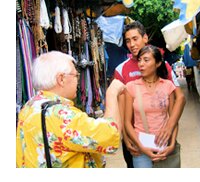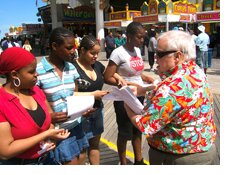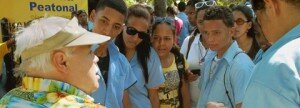A Day in the Life of Dr. John B. Chittick, Harvard Ed.D., IAS Member and Executive Director TeenAIDS-PeerCorps (TA-PC), United States
 Posted 30 August 2013, 07:28 A, by IAS Member
Posted 30 August 2013, 07:28 A, by IAS Member
I was a businessman in the 1980s when AIDS exploded onto the world scene. Within a few short years, I had seen students, employees and friends die. One young woman on her deathbed begged me to take an active role in saving young lives. I decided to devote my life to the cause. I sold my business to do my Harvard doctoral research where I lectured and predicted that sexually active teens would become a higher-risk group within a decade. Many adults scoffed at the idea that the younger generation could become one of the risk populations. Yet I argued that HIV was not about who you are but what you do and unprotected sex would lead to a significant youth epidemic. In 2010, UNAIDS says, young people aged 15–24 accounted for 42% of new HIV infections in people aged 15 and older.
I became a full-time volunteer in this fight to stop the further spread of teen HIV because I believed youth would join in this fight if properly motivated. In 1998 I embarked on the first Global AIDS Walk to train peer teachers to educate friends and neighbors. I have since worked closely with ASOs and neighborhood youth in 86 countries with more to come. The PeerCorps concept is based on the altruistic spirit of young people committed to saving lives.
I am now leading the first “live” public testing of youth in the U.S. using the simple oral swab home test kits. While controversial initially, it is becoming accepted as a viable alternative to traditional testing sites that 90% of youth avoid. The goal is to get as many young people tested as possible wherever and whenever they choose to do so.
When I am home in the U.S., my day starts checking my overnight emails. Every “ping” alerts me to unfolding events and crises, what bills must be paid, and who needs my attention. I answer teens’ questions about whether their actions could have put them at risk for HIV, reading carefully between the lines if English isn’t their first language. After all, they are asking about intimate sexual health matters that seriously impact their futures.
 Soon the college interns arrive, all volunteers, and we go over our day’s work and long-range plans. They are on Skype with youth in Indonesia, Brazil, Ukraine, Kenya and points in between. The video editors go over footage, “Cambodia Countryside Brothel ’02” and ask me questions. I film everything during my Global AIDS Walks and it serves as a visual record and reminder of youth in harm’s way, always a heart-wrenching experience even years later.
Soon the college interns arrive, all volunteers, and we go over our day’s work and long-range plans. They are on Skype with youth in Indonesia, Brazil, Ukraine, Kenya and points in between. The video editors go over footage, “Cambodia Countryside Brothel ’02” and ask me questions. I film everything during my Global AIDS Walks and it serves as a visual record and reminder of youth in harm’s way, always a heart-wrenching experience even years later.
The phones ring constantly. I actually prefer answering many of them, often a surprise to the caller. I check to see if we have the cash to do live HIV street testing. The process of oral swab testing is easy and quick. However, the intensive counseling that’s required takes patience and sensitivity. It’s wonderful when a youth who is worried gets a negative test – just as it’s heartbreaking when someone gets a positive result. My job is to explain that a confirmatory test is needed asap. With medications available, AIDS is no longer the death sentence it once was.
Running a local, national and international organization, staffed by dedicated volunteers is not always easy but it inspires me every day to do my best because a world of youths is counting on us.


